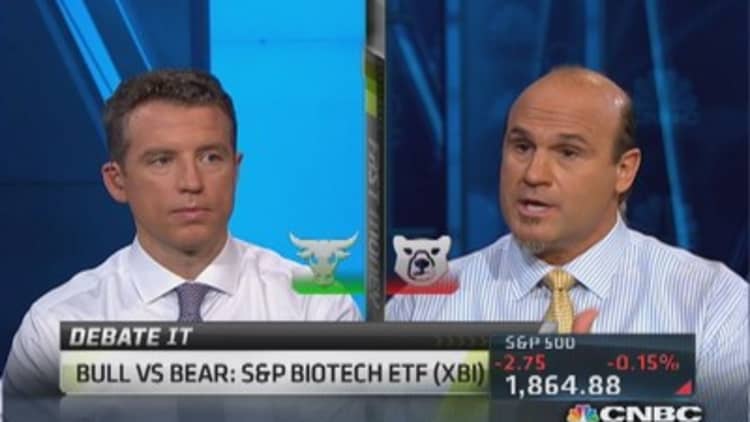Quick quiz: What technology niche is currently attracting a ton of IPO buzz for companies that don't generate a cent of revenue? If you answered social media, you're wrong. The pace of biotechnology companies going public without any revenue to speak of has been even more torrid than social media IPO offerings.
Sixteen biotech companies had IPOs in the first six weeks of the year, including those with promising drugs in the pipeline for a host of rare genetic conditions—and one developing a non-injectable form of Botox.
Biotech was the most active IPO segment in 2013 and already accounts for almost half of the 40 IPOs in the first six weeks of the year that topped $7 billion in market value and an average first day return of 18 percent, according to Greenwich, Conn.-based Renaissance Capital, an IPO investment advisory firm.
"The segment has opened up because of some real progress in targeted therapies, especially for cancers, the fast-tracking of orphan drugs [drugs targeting rare diseases] by the FDA, and M&A and investments by major pharmas," said Kathleen Smith, principal of Renaissance, of the fast and furious action in biotech.
(Read more: High dividend-paying tech stocks still undervalued)
Biotech IPOs also have been boosted by insider buying on the deals and large discounts on proposed IPO ranges. Biotech offerings have had strong returns and unprecedented levels of issuance, but broader technology companies have recently produced stronger returns.
The mammoth success of Regeneron Pharmaceuticals, the maker of a drug that treats age-related macular degeneration, kicked off the current round of investor interest. The Tarrytown, N.Y.-based company's Eylea is expected to record 2014 U.S. sales in the range of $1.7 billion to $1.8 billion. It had $1.4 billion in sales in 2013, according to Zacks Equity Research.
"It reminded people of how much value can be created with single-product successes," said Luke Evnin, managing director of Boston and San Francisco-based MPM Capital, a private equity firm that specializes in health-care investing. "(Investors) started hunting around biotech for the next story."
Pre-revenue biotechs are a risky bet, but investors appear to be going on the hope of further big wins in the market. Though the chances of bringing a drug to market is relatively low—about a 30 percent success rate if a drug is in State 2 trials, according to Morningstar health-care strategist Karen Andersen—a drug that does make it to market stands a very good chance of making big money.
(Read more: The mystery of Google's 'other' revenue)
Life (sciences) support
Some of the surge of biotech IPOs stems from pent-up demand. After the 2001 crash, there was a dearth of public offerings in the space for more than a decade. The Renaissance IPO ETF, a cap-weighted basket of recently public companies and indicator of post-IPO performance, has gained 7.2 percent this year compared to 1.6 percent for the S&P 500, suggesting that the IPO market remains receptive to new issuance.
Experts do expect the pace of biotech IPOs, specifically, to moderate. "There was a ... list of companies that had not gotten access to the public markets. That's started to cool off now. A much reduced flow of companies makes sense," said Evnin. Eight companies in MPM's portfolio had public offerings last year; Evnin said two or three of its portfolio companies will do so this year.
Biotechs can win either by addressing a very large market or developing a drug with a lot of pricing power. Among the biotech companies that had IPOs this year were Newport, Calif.-based Revance Therapeutics. It addresses one of the most common diseases in America: crow's feet. It is in trials with a non-injectable form of Botox.
Others are developing drugs for rare disorders. Those include Watertown, Mass.-based Dicerna Pharmaceuticals, which had a $126.4 million IPO. The company is valued at $610 million. Novato, Calif.-based Ultragenyx Pharmaceutical had a $92.9 million IPO. The company is valued at $1.62 billion.
(Watch: Social media stocks boosting tech)
The business model for those kinds of drugs—if they're approved—includes astonishing pricing power. For instance, San Rafael, Calif.-based BioMarin recently received approval for a drug called Vimizim to treat a rare, progressive, debilitating disease called Morquio A Syndrome, which shows up in children. The drug will sell for an estimated $380,000 a year for a single patient, according to Morningstar's Andersen. Eventually, insurers may push back on the prices, but so far pushbacks are rare.

Big pharma, big backers
While valuations for new biotech companies may seem astronomical based on lack of revenue, the market benefits from the unusually strong presence of institutional investors—both private equity funds and pharmaceutical companies. "(The biotechs) probably have a stronger probability of success than they did before," Andersen said.
For instance, biotech investment firm MedImmune Ventures, based in Gaithersburg, Md., is owned by London-based giant AstraZeneca. MedImmune backed Monrovia, Calif-based Xencor, which completed an IPO in December. MedImmune has 16 companies in its portfolio, according to its website.
"The big pharma and life-sciences companies are getting more directly engaged in venture capital, and by extension pre-IPO companies as a way to lubricate their development pipeline," said Darren Rush, CEO of GrantIQ, a Los Angeles-based data-services company focused on start-up funding.
A preproduct IPO can serve as a final round of financing for biotech companies to win approval for their drugs. "It becomes a good liquidity strategy," said Rush.
Private equity funds that own shares of the companies often buy some additional shares at the IPO to maintain their ratio of ownership. Those purchases help assure that the stock price will stay strong.
Dicerna offered shares at $15 each and had a 206 percent first-day pop. Its shares are now trading at more than $36.
Downriver, the pharmaceutical companies play yet another role in the market for biotechs. If a biotech doesn't succeed or can't sustain itself on its own as a public company, big pharmaceutical players offer another possible exit: a buyout. If a biotech's drug isn't approved, a big pharma might find value in the research, Rush said.
What looks like a bubble at first glance can be viewed as a long-term strategy for funding drug development, one that involves private funds, pharmaceutical companies and the public markets, along with a good deal of risk—and, sometimes, high reward.
—By Elizabeth MacBride, Special to CNBC.com




